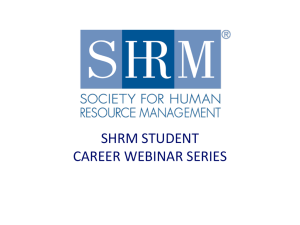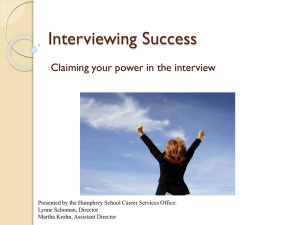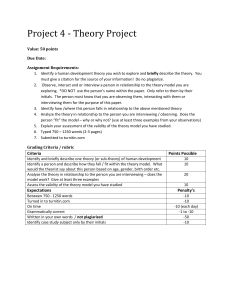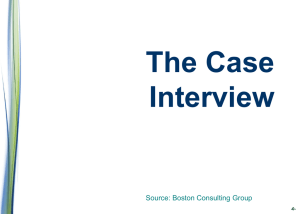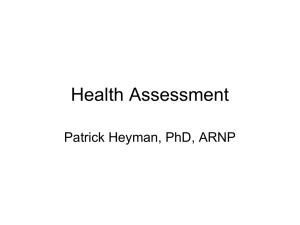Interviewing Strategies
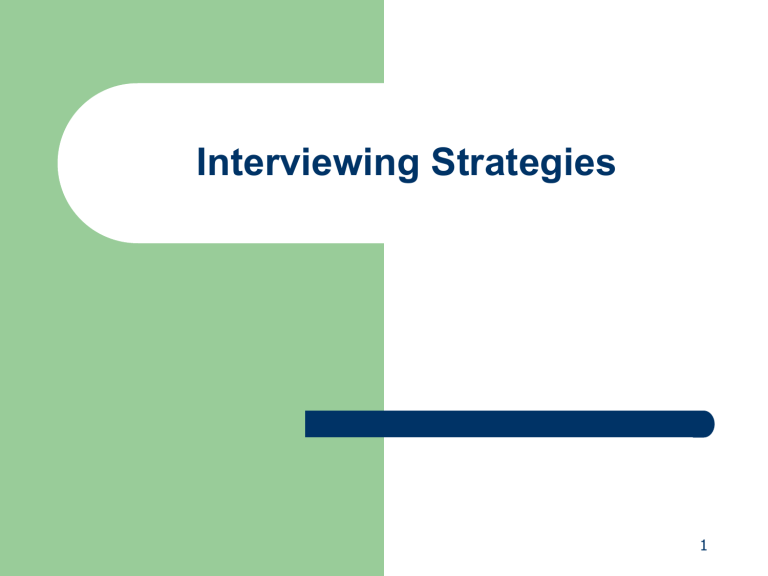
Interviewing Strategies
1
Agenda - -
Interviewing is a sales process
Interview types and formats
Basic interviewing principles and rules
Commonly asked questions / competency based questions
Questions YOU should ask
Closing and follow up
2
Interviewing is a Sales Process . . .
IF
Your FEATURES
Can solve their problems or address their NEEDS
THEN
You can demonstrate BENEFITS
3
Interview Mission
Find a MATCH between you , the employer and the job
CAN you do the job?
WILL you do the job?
Is there a FIT ?
4
Impact of Communication
Verbal ____ % (words)
Vocal ____ % (voice)
Visual ____ % (appearance; body language)
5
Interviewing
Types
Screening
Qualifying
Approval
Psychological
Blessing
Formats
One-on-One
Telephone
Panel
Round Robin
6
Selling Yourself
Focus on your ACCOMPLISHMENTS
C
HALLENGE
A
CTION
R
ESULT
7
Interviewing Principles
Know yourself and review your accomplishments
Dress appropriately, neatly and conservatively
Be polite and pleasant
Let the person you are calling on indicate where you should sit
Be careful to control signs of nervousness
Concentrate on your values
8
Interviewing Principles
(continued)
Demonstrate enthusiasm
Project optimism
Take a positive view of things
Never discuss personal problems with an interviewer
Avoid premature discussion of salary
Be an alert listener and observer
9
Interviewing Principles
(continued)
Concentrate on the idea of making a contribution in a team environment
Follow the interviewer’s pace
Respect the confidence of past employers
Be yourself, not what you think someone else expects you to be
Ask for a business card
10
Rules of Interviewing to remember
1.
Keep it brief (1 minute)
2.
Stop talking when you have said enough
3.
4.
5.
6.
Listen carefully
Don’t be modest
Don’t exaggerate
Talk in concrete terms (use accomplishments as examples)
7.
Never defend or argue
8.
Make connections for the interviewer
11
Commonly Asked Questions
1.
2.
3.
4.
5.
6.
7.
8.
9.
10.
11.
Tell me about yourself…
What are your top three strengths?
What are your weaknesses?
How would you describe your relationship with your former manager?
What is your work / management style?
Tell me about a project that did not turn out as you anticipated. What did you learn from this experience?
Tell me about a time when you had a major conflict with a colleague. How did you approach problem resolution?
Why are you interested in our company?
How would your peers / subordinates / manager describe you?
Why should we hire you?
What are your salary requirements?
12
Competency Based Questions
Give an example of a time in which you…
Describe a situation in which you…
Describe the most significant…
Recall the most…
13
Responding to Negatively Based Questions
Start the response with a positive (generalize)
Talk about the negative
End on a positive (how you have learned to manage the negative)
14
Questions You Should Ask
You’re investigating an opportunity . . .
looking for a FIT
Why is the position available?
What is the most important thing I can do for you in my first 90 days on the job?
What do you think is the greatest opportunity for the organization in the near future? The biggest threat?
What has been your best experience working at the company?
15
Attitude Strickouts . . .
The following “Attitude Strickouts” most often condemn job candidates . . .
5.
6.
7.
1.
2.
3.
4.
8.
9.
10.
Don’t ask questions
Condemnation of past employers
Inability to take criticism
Poor personal appearance
Indecisive, cynical, lazy
Overbearing, overly aggressive, “know it all”
Late to interview
Failure to look at interviewer while interviewing
Unable to express self clearly
Overemphasis on money
16
Closing and Follow Up
At the interview . . .
Ask any questions that haven not been answered
Discuss next steps / ask permission to follow up
After the interview…
Send Thank You letters
Follow up with potential employer
17
Remember . . .
Don’t assume you know when the interview is over . . .
The interview is not over until you no longer have an interest in the job.
Until then, the clock is ticking.
18




